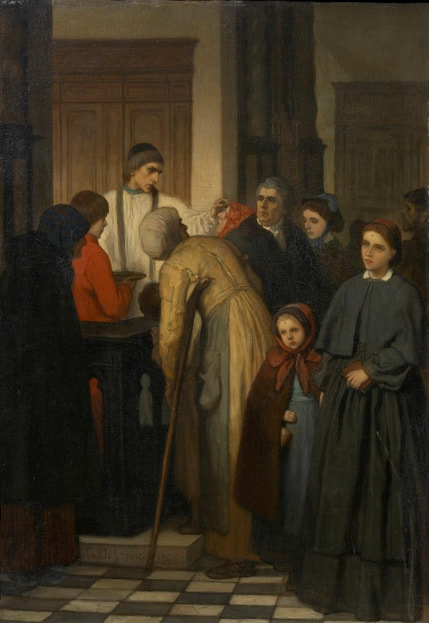Ash Wednesday, February 26, is one of the most curious but powerful moments in the church year. It is a holiday (technically a "fast" rather than a "feast" like Epiphany or a saint's festival) not connected to the life of Christ or any particular event in the history of the church, but addressed to two permanent facts of human life: 1) we are going to die; and 2) we are sinners in need of repentance.
Ash Wednesday is not especially old as church holidays go, taking its current form some time in the 11th century and then only in the Latin, Western churches. It is the last remnant of the ancient practice of what was called "canonical public penance," in which people whose public lapse from Christian life (a really flagrant sin, denial of the faith, etc.) were placed outside the church in a posture of mourning and supplication. This included literal sackcloth and ashes and sitting outside the entrance to the church asking the prayers of the faithful. After a suitable period of penitence, the lapsed person would be restored to the fellowship of the Church by the laying on of hands and absolution on Maundy Thursday, at which time they would rejoin the celebration of Holy Communion.
This whole set of practices dwindled away, leaving only the imposition of ashes on everyone at the beginning of Lent. I don't know which monk or bishop had the idea of doing the ashes in the sign of the cross on the forehead, but they would have deserved a MacArthur genius award for coming up with such an eloquent and powerful symbol. So Lent became a season of fasting and repentance for the whole church, in which we all are supposed to put ourselves in the position of the penitents praying to be restored, and Ash Wednesday its solemn and highly dramatic beginning.
The readings for the day never change. We always hear the prophet Joel's call to a solemn assembly of the people of Israel to beseech God's favor. We hear Paul tell the Corinthians that "now is the acceptable time; now is the day of salvation." And we hear Jesus's own instructions on fasting, prayer, and giving alms. It is a good season to ponder those things: what can be given, what we can (or should) refrain from to focus more fervently on God's goodness, and how we can pray for regularly and honestly.
Be sure not to miss this very moving, very powerful day. Holy Communion with the imposition of ashes at 12 p.m. and 6:30 p.m.
Further Reading:
It's a holiday that provokes fascination. T.S. Eliot wrote a powerful poem, "Ash Wednesday," about his own conversation to Christianity (you can find it online easily but probably only at sites that are violating copyright so I won't link to them).
I've preached on Ash Wednesday almost every year since before my ordination. Some places I've been with this text:
“Hardness of heart” is a powerful metaphor. Because that’s how we live and make our choices: one at a time, little by little, day by day. We don’t feel the sclerosis of our hearts because it doesn’t happen all at once. We just lose that softness a little bit each day. We lose that responsiveness to God, or to conscience, or to our neighbor. At first it was hard to ignore the voice of God, but it got easier every time. A hard spiritual heart, like a hard physical one, eventually just stops working. (2018)
So I’m asking you to join me in a fast. This year, for Lent, I am going to fast from trivial apologies. I am not going to dress grief in my words. I’m not going to say, “Sorry.” When I have wronged God or my fellow human, I will try to name it to myself and to that person, and to own it, and to let myself feel bad if it’s something a person ought to feel bad about. (2015)
To take a relatively harmless example: Did I eat so many paczki yesterday because I am a glutton who lacks self-control? Or was it a stressful day and our bodies process stress by urging us to eat more? (2016)
In Lent, those of us who are in between, who are regular folks trying to live out our faith, will be moved to the edges of the church. We are invited to feel the fear and exclusion that sin creates for us. And we are invited to welcome the grace of God as if for the very first time. When we stand in between, it’s only because we are being pulled both ways at once. (2017)
In order to understand what Jesus means here, you need to imagine your right hand as the “good” hand. Your right hand gives alms to the poor. Your right hand seeks to do good in the world. Your right hand wants to pray. Your right hand wants to be purified through fasting. Now imagine your left hand as the “bad” hand. Your left hand wants you to keep everything for yourself. Your left hand wants you to act without any regard for others. Your left hand is heedless of God. And the problem with religion, Jesus is saying, is that it can become a sleight of hand. It becomes a way to pass something from one hand to another. And so my selfish desire for praise starts in my left hand, but it gets moved ever so secretly to my right hand, in the form of the giving of alms or the saying of prayers. And now I’m doing something good! Nobody saw the switch, from one hand to the other. More importantly, I didn’t even see the switch myself. (2014)


 RSS Feed
RSS Feed